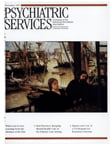Effects of parental involvement on the functioning of noninstitutionalized adults with schizophrenia
Abstract
OBJECTIVES: The study described the nature and extent of parental families' involvement with adult children with schizophrenia who lived in noninstitutional settings in the community and examined the association between families' involvement and the adult children's clinical and psychosocial functioning. METHODS: A total of 193 subjects with schizophrenia were interviewed to obtain data on their contact with their families, clinical and psychosocial functioning, risk of victimization and substance use, and global functioning. RESULTS: Twenty-three percent of the subjects lived with their parental families on some time during the previous six months. Nearly two-thirds of those who did not live with their families had contact with them an average of twice a week. Subjects who did not live with their families scored significantly higher on global functioning and on measures of contact with friends, dating, number of days worked, independence from family, and stability of living situation. Those who lived with their families were less likely to have been victimized or to have used substances. Among subjects who did not live with their families, those who maintained contact scored higher than those without contact on measures of days worked and overall role functioning. CONCLUSIONS: The nature of parental families' involvement with adult children with schizophrenia varied widely. Whether families' involvement was associated with higher levels of functioning varied with the subjects' living situation.
Access content
To read the fulltext, please use one of the options below to sign in or purchase access.- Personal login
- Institutional Login
- Sign in via OpenAthens
- Register for access
-
Please login/register if you wish to pair your device and check access availability.
Not a subscriber?
PsychiatryOnline subscription options offer access to the DSM-5 library, books, journals, CME, and patient resources. This all-in-one virtual library provides psychiatrists and mental health professionals with key resources for diagnosis, treatment, research, and professional development.
Need more help? PsychiatryOnline Customer Service may be reached by emailing [email protected] or by calling 800-368-5777 (in the U.S.) or 703-907-7322 (outside the U.S.).



